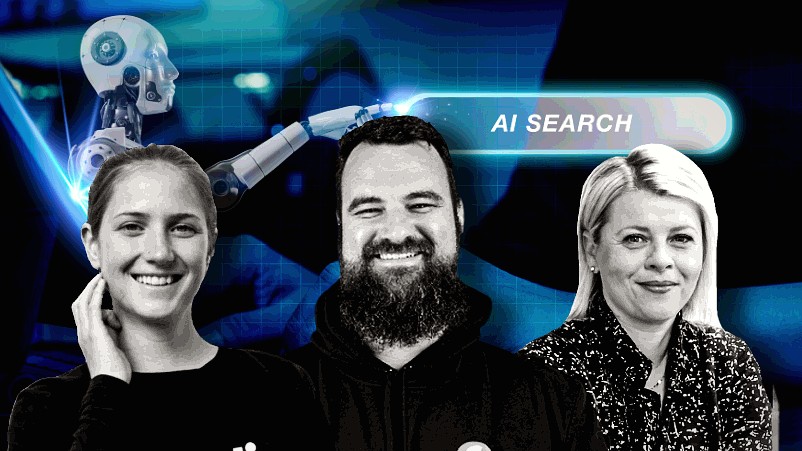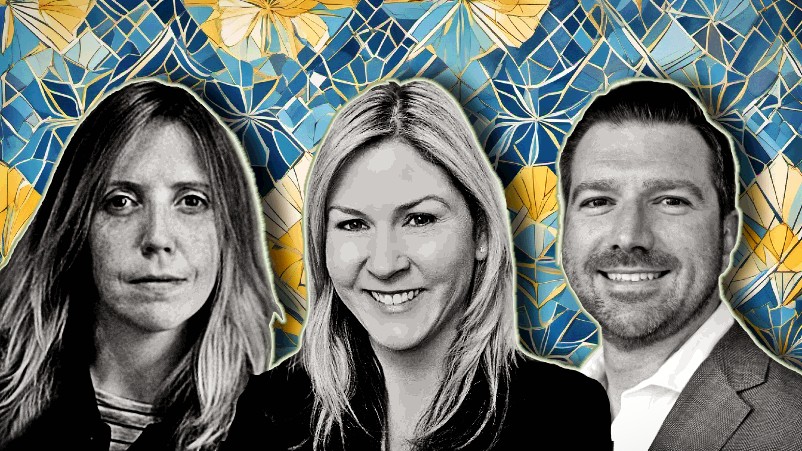‘The bots are just execution’: TBWA appoints ex-Optus tech and innovation chief Lucio Ribeiro as ‘first’ creative agency Chief AI & Innovation Officer in APAC

TBWA\Melbourne CEO Kimberlee Wells, AI & innovation chief, Lucio Ribeiro and Chief Creative Officer, Paul Reardon
Mark Zuckerberg made it clear last week that Meta aims to do away with the need for human-built creative: Hand the business objective and the money to Meta and watch AI do the rest. But TBWA\Melbourne CEO Kimberlee Wells is orchestrating a counter-plan, spearheading the appointment of former Optus tech and innovation lead Lucio Rebeiro - who left the telco for a brief marketing stint under Seven’s former CMO Mel Hopkins – as the agency’s national Chief AI & Innovation Officer. It’s the first such role for a creative agency in APAC, the pair say – and humans and curiosity are still central to feed the machines context and insight. Otherwise genuine innovation, per Rebeiro, is off the table, because "the bots are just execution". Enabling, delivering and deploying creative innovation via AI, say the duo, will be a key point of differentiation for TBWA and its clients – and Wells thinks some would-be rivals lack the firepower to keep up.
Curiouser and curiouser
“The most important attribute we can hire anyone on at the moment is their level of curiosity – writ large across the whole industry,” according to TBWA\Melbourne CEO Kimberlee Wells.
As the media and marketing industry – and much of the digital economy – moves through the looking glass, finding candidates that can clear that threshold is harder than it used to be, she acknowledged, but not impossible. TBWA’s newest recruit, Lucio Ribeiro, is case in point.
The former Optus tech and innovation lead is the agency’s first chief AI & innovation officer and says both aspects must necessarily go hand in hand or risk the tail wagging the dog.
“Disruption is nothing new,” per Ribeiro. “Change, the migration of value across some executions, is already happening. But my biggest belief is still on creativity … the bots are just execution.”
Ribeiro, Wells, and the TBWA mothership are out to show that AI isn’t all about efficiencies – while offering resistance to the march of Meta’s bot army and Mark Zuckerberg’s plan to cut creative agencies out of the chain in which money flows from brand to platform.
“I’d be more worried if I had customer services and sales, that is going to be impacted a little more,” per Ribeiro. That said, for media, “there’s a whole lot of impacts we cannot run away from,” he acknowledged, and for the media supply chain, “there is no denying things are going to change”.
Non-conventional wisdom
While some creative agency execs privately fear being rapidly outmatched by AI, talk of Meta wiping out the ad industry is overcooked, reckons Wells.
“What sits underneath the tool set still is human ingenuity. We still need super curious humans to be thinking about what is the best use case for all of these tools,” per Wells.
“One of the fundamental components when we talk about disruption is conventions: What are the conventions that exist in the marketplace that we're trying to break? That is the premise of disruption. AI is a convention machine, to borrow the words of [TBWA\Melbourne Chief Creative Officer] Paul Reardon; it's been trained on what has been done before.
“Our reason for getting out of bed every morning is to try and help our clients find opportunities for growth that sits outside of what is conventional practice,” she added.
“AI plays a role in helping us understand that in very short order … But fundamentally, the tooling itself is conventional.”
“So I don't like the word ‘existential’. It's change, but the industry changes all the time, it's just another wave.”
On Meta’s master plan, Wells thinks disposable “lightweight” content made by humans will be replaced.
“I'm pretty sure AI is going to be able to help solve for some of that. It's going to be able to create the scale that some brands are looking for to fill all the spaces in between their tent-pole moments. But brands still need to have moments of fame and engagement … and I'm just not convinced that that can be done entirely through AI and the Zuckerberg solution”.
Ribeiro is more direct. “I’m not sure he is the best predictor in the world.”
Meta, he said, is “very good at media targeting and fulfilling demand … but not necessarily creating demand … Growth comes much more from creating new demand … and there is nothing better at that then creativity.”
Which is why TBWA wants to position as an AI frontrunner agency – with Ribeiro tasked locally with ensuring everyone’s running in the right direction.
“Lucio is here as the leader to bring all of the work that we're currently doing together … so we can go further, faster, and really lead the change,” said Wells.
“Creative agencies have always been advisors. We've always played an advisory role, and so having someone in our business that's operating at the C-suite level, to be able to engage with our clients at that level and help them navigate their way through, is a really important function right now,” she said.
Scale matters
While independent agencies tout their agility and ability to outmanoeuvre holding company-owned networks, Wells thinks in a disrupted economy, some may find size does matter.
“TBWA has 12,000 staff around the world and many minds looking at this [AI]; there is a lot of benefit for us to be able to do it at scale.
“We hear the indies talk all the time about ‘big agencies are dead’. But they can't replicate the speed with which we are thinking about this problem. Because while we sleep, we've got people on the other side of the world writing prompts, sharing prompts, thinking about different ways that we can use the toolset. It's going backwards and forwards. So I think we're in a in a really favourable position.
"The scale that Omnicom can bring to an AI-based conversation is second to none," adds Wells. "I just don't know how the indies will compete with that."
Ribeiro is succinct: “The global muscle is phenomenal.”
Defence to offence
Wells said TBWA\Melbourne’s landing of the Australian Defence Force Recruiting account – one of the biggest in pieces of creative business in Australia – prompted the plan to broaden its executive capability.
“We really wanted someone to join the team that had a strong command of AI and innovation, to bring fresh thinking into the agency, and also think about where the operational and the creative opportunities are,” she said.
“There's lots of clients that want to think about AI in terms of production, but production is only one part. I would say it sometimes gets the wrong attention. So many people are running at this at full power thinking there are efficiencies to be gained – and I’m sure over time there will be efficiency. But we definitely see this as being additive to the tool set the agency uses, not necessarily a replacement for all the smart minds that the agency employs.”
'Smoke, mirrors, charlatans'
Figuring out how AI is going to change day-to-day working is one aspect under Ribeiro’s remit. Arguably the bigger task is figuring out how it will alter client brands’ businesses – how far and how fast they make those changes, and which decisions they might be best to avoid making.
“We have a job to do to help guide all our clients through this. Some of it smells a little bit like the digital transformation period that everybody went through, and the smoke and mirrors. There were charlatans, there were agencies that were building out their own IP from a digital perspective that then locked clients in that then made it difficult for them to shift agencies,” per Wells.
She said TBWA will take the opposite approach.
“We believe in democratising access, simplifying it, and making sure that both clients and ourselves can benefit from the innovation that's coming forward.”
But first Ribeiro is tasked with finding out where brands and marketers are actually at with AI, and picking out signals amid the noise.
“This is a listening tour right now … If they want to go fast, we can hold hands and run fast together. If they want to go slow, we can go slow, that is not a problem,” he said. “But there are a lot of opportunities – and one of the definitions of innovation is finding new ways to solve old problems.
“If you think about emerging technologies, they really flourish when there is synergy of ecosystem or individual developments. That eventually converges into an integrated, functional system – but it's always fuelled by creativity.”
Eventually, but they usually strip out legacy components along the way.
Wells aims to ride the disruptive wave.
“If we can be the most highly regarded agency in the southern hemisphere because of how we have embraced AI loudly, and because of how we've been able to make sense of the changing market conditions with creativity at our core, then let's just fucking go. Let's have at it – because I think we have to.”








